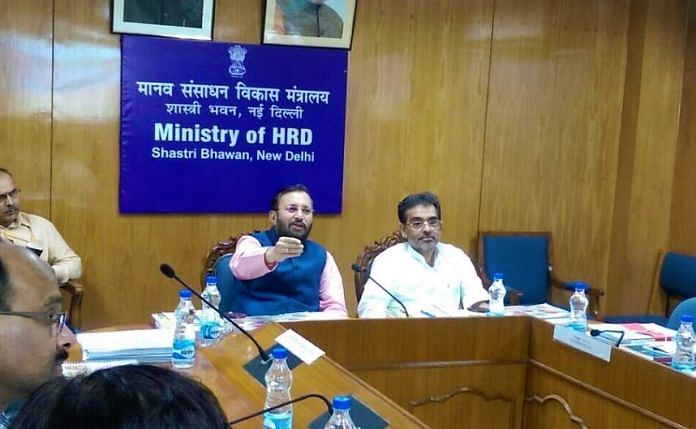HRD ministry wanted to amend the AICTE Act, but is now backing the proposal to appoint a single regulator for all higher education in the country.
New Delhi: More than 3,000 technical institutes in the country fall in a regulatory grey zone – they come within the purview of both the University Grants Commission (UGC) and the All India Council for Technical Education (AICTE). And this limbo is set to continue, as the Human Resource Development ministry has withdrawn a Cabinet proposal to amend the AICTE Act.
Instead, the ministry is now throwing its weight behind the proposal to have a single regulator for all higher education in the country.
Thanks to this lack of regulatory clarity, these colleges were barely regulated and there was a rising number of complaints on academic quality, among other issues.
Then, just a few months ago, the Prakash Javadekar-led HRD ministry had moved the Cabinet to amend the AICTE Act, 1987, aiming to decide who would regulate these institutes. This, it hoped, would address issues regarding the regulatory overlap over engineering colleges affiliated to universities.
However, the ministry now feels that an amendment would not be enough to address the bigger regulatory mess, and nothing short of a single regulator or a more comprehensive overhaul of existing laws will help.
The mess
While AICTE is the regulator for all technical education in the country, the UGC is the apex regulator for higher education across universities and colleges. This regulatory overlap has led to a situation where a number of engineering colleges affiliated to universities fall in a grey zone. In many cases, these colleges are not regulated at all.
The HRD ministry had moved the Cabinet to amend the AICTE Act, with the Cabinet note proposing that all engineering and technical institutes affiliated to a college be regulated by the AICTE, while those directly under a university be regulated by the UGC.
However, there has now been a rethink on the issue. Sources said the ministry felt it may be better to address this concern keeping in mind the proposed single higher education regulator.
Sources confirmed to ThePrint that the ministry would write to the Cabinet Secretariat seeking to withdraw its proposal.
The single regulator remedy
Regulatory overlap issues have been a serious cause of concern for years now. Most recently, the Supreme Court ordered the cancellation of thousands of engineering degrees from courses offered by deemed universities on distance mode, and raised strong questions on regulatory overlaps.
The Narendra Modi government has been planning a single apex regulator to replace the likes of the UGC and the AICTE, eliminate irrelevant regulatory provisions, and do away with jurisdiction-related regulatory overlaps.
The NITI Aayog had earlier this year formulated a template for the apex regulator – tentatively named the Higher Education Empowerment Regulation Agency (HEERA). The government has been working on the concept since March 2017, following a meeting on education chaired by the Prime Minister.
It was also agreed that since bringing in a new legislation for the single regulator involved a long process, interim measures would be taken to initiate reforms.
A number of modifications have already been made in the regulations under the UGC Act, as part of these measures. However, the push for HEERA has moved into a slow lane since the change of guard at the NITI Aayog, when Arvind Panagariya resigned as vice-chairman and Rajiv Kumar took over.




Please sir, you focus on the remuneration of non-permanent employees of AICTE approved institutions in West Bengal, to improve their ability to take classes.
Good to see the article. Please do write more on Deemed and Private Universities Mess affectimg quality of Education and widespread FAKEISM in every thing that they do. 10 percent of good work and about 60 percent of squeezing citizens and FAKEISM. It has become a source to earn perpetual extra buck by UGC employees and officers from Deemed universities and for staff in Ministry level at state governments from Private Universities.